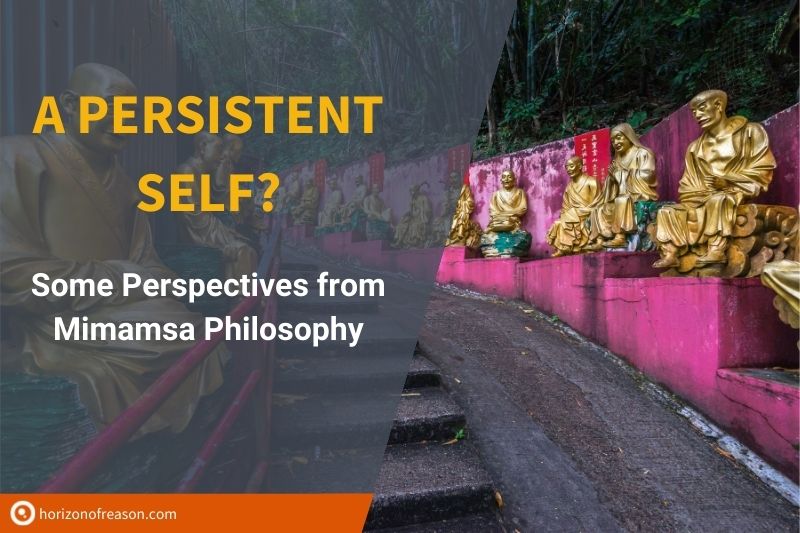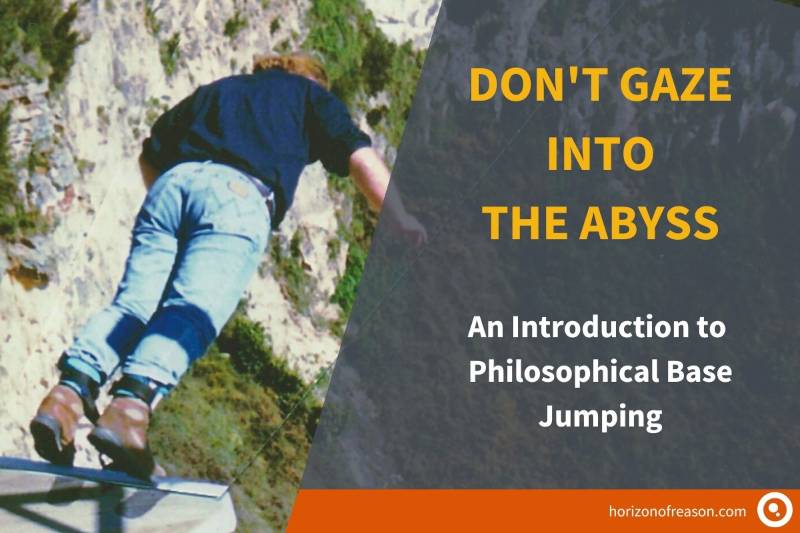
A Persistent Self? Some Perspectives from Mimamsa Philosophy

Peter Prevos |
1230 words | 6 minutes
Share this content
The various Brahmanical schools (Vedanta, Nyaya and Mimamsa) offer distinct arguments for the claim of the persistence of the self. This article discusses the Mimamsa argument for the persistence of the self and the Buddhist answer to this problem. The last section question reviews whether there is any need to defend the continuation of selves over time.
The Mimamsa argument of self-recognition
The Mimamsaka proves the persistence of the self through the argument of self-recognition. In essence, the argument states that when we remember and experience, it directly reveals the existence of the self because the 'I' from this memory is the only thing that has not changed. For memory to occur, there must be a single continuously existing substance which both had the remembered and experience and remembers it. The Mimamsaka, therefore, concludes that I have existed continuously in the past till now. The argument is based on the premise that we can only remember our own experiences.
The Mimamsa hold that each experience reveals three aspects: the object or the fact, the awareness itself and the cogniser self. When we have a memory of an event from long ago, we remember these three aspects. The only element of this memory that does not change is the cogniser self. The self can not be identified with the body or a cognitive state because they would under no circumstance be identical with the present body or cognitive state. From this, we can deduce that in recognising ourself we do not recognise a body or a cognitive state, but the self itself.
The argument is not merely a linguistic argument inferring the existence of the self from the use of the word 'I' because the term refers directly to our experience of recognition. This recognition, however, poses some epistemological problems because it is based on the intuition that we are a distinct and persistent self.
Possible objection against the argument
The Mimamsa claim that we recognise a persistent self is based on the phenomenological content of our memory experiences. Phenomenological content means that we "focus on the content of the experience that is immediately felt by or perceived by the subject of the experience".1 The phenomenological content of our experiences takes place in our private minds and is (fortunately) not open to verification by others. The Mimamsaka argument for the persistence of the self is, however, directly dependent on the phenomenological content of our experiences. The recognition that the current self is the same as the self is therefore not empirically verifiable.
Empirical verification is an essential criterion for truth in common sense philosophy. For this exercise, I use this common-sense definition of truth. A more detailed explanation of truth and subsequent discussion of the epistemological implications of the Mimamsa argument is outside the scope of this exercise. This empiricist dogma is rooted very deeply in every day and scientific thinking. Because of this, we are forced to be sceptical about anything that can not be perceived directly or verified. The Mimamsaka, however, subscribes to a broader epistemology: every cognition or experience as it arises counts as knowledge and does not require further justification and can be falsified only if it is contradicted by further cognition or experience.
Also, in science, the existence of entities that are not directly perceivable are postulated. The most direct example of this is gravity. The actual gravitational fields, as proposed by the general theory of relativity, have never been measured. Only the effects of gravity can be observed when, for example, the proverbial apple drops from the tree.
The theory of the self is in this respect, for example, comparable to the general theory of relativity, which proposes the existence of gravitational fields. The self itself might not be perceivable, but the effects of the self can be observed and form the foundation of our social system. It can thus be concluded that the verification criteria, therefore, do not demolish the Mimamsa argument of self-recognition.
The Buddhist notion of the self
The Buddhists reject the notion of a persisting self; they would argue that there is no such entity at all. The Buddhist theory of the self is that there is no 'self' distinct from the mental and bodily states. According to Buddhist philosophy, a person is not a single substance existing continuously through time, but a series of physical and mental states also called 'person states'.2
Each person state consists of various psychological and physiological factors, the skandhas. These skandhas are not persistent in time but last only for one infinitesimal period. The person states fleet away and give rise to new person states in an endless cycle of cause and effect. Every single person state only exists for an infinitesimal period, and therefore, there can not be a persistent self. The instantaneous succession of skandas gives the impression of continuity, which makes us believe that a person persisting over time exists.
The reality for the Buddhist is in a continuous state of flux. Everything is ever-changing, or as the ancient Greek philosopher Heraclitus put it: "We step and do not step into the same rivers, we are, and we are not".
The existence of a persistent self is, therefore, only an illusion to the Buddhist. The Buddhist account of the non-self is very plausible and can give an account of continuity over time. The self does not exist as a separate entity, but it is an epiphenomenon, a side-effect, emanating from the eternal procession of skandhas.
The Buddhist explanation of our intuition that we are a self can be considered as a cognition that contradicts the Mimamsa claim that our memory experiences directly reveal a persistent self. The Mimamsaka does, however, not rely on the argument of recognition to prove the existence of the self because this is already established by other evidence and the scriptures.
The necessity of a persistent self
The two theories if the persistence of the self as described above, both give a plausible explanation of our intuition. The actual truth can not be verified since the self is according to the Mimamsaka or the Buddhist, either a non-material entity or a metaphor. Both theories can only be appreciated from within their historical and cultural context. The question to be addressed is thus not if the self exists or not, but whether there is any need to defend the persistence or at least the continuity of the self over time.
The notion of a persistent self is an essential presupposition on which our society is based. When we accept the existence of the self, we also have to acknowledge the Other. The Other is the focal point of ethics; without the self, there is no Other, without the Other, there is no morality.
The Mimamsa argument provides a theory of the self as an independent entity, the Buddhist explains the self as an epiphenomenon of the physical body and denies the existence of a self and even does not attempt to give an account for the self. It seems that this dilemma—which I can not even try to solve within the limits of this exercise—must be decided in favour of the Brahminical account to save morality and prevent society from slipping into nihilism.
Notes
Share this content


